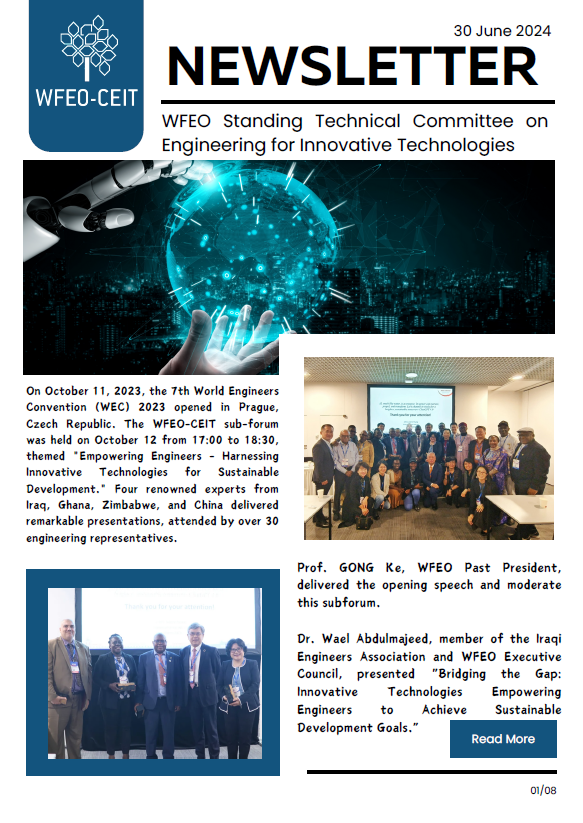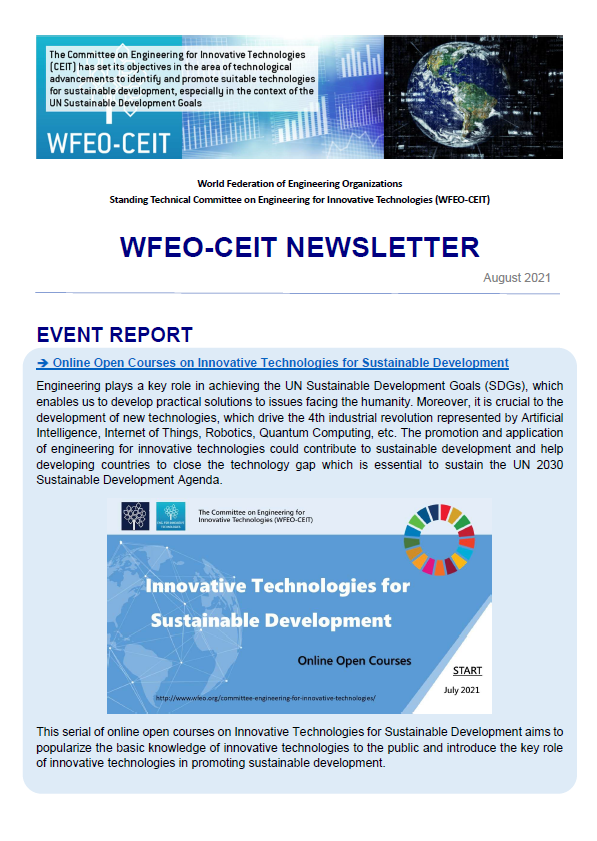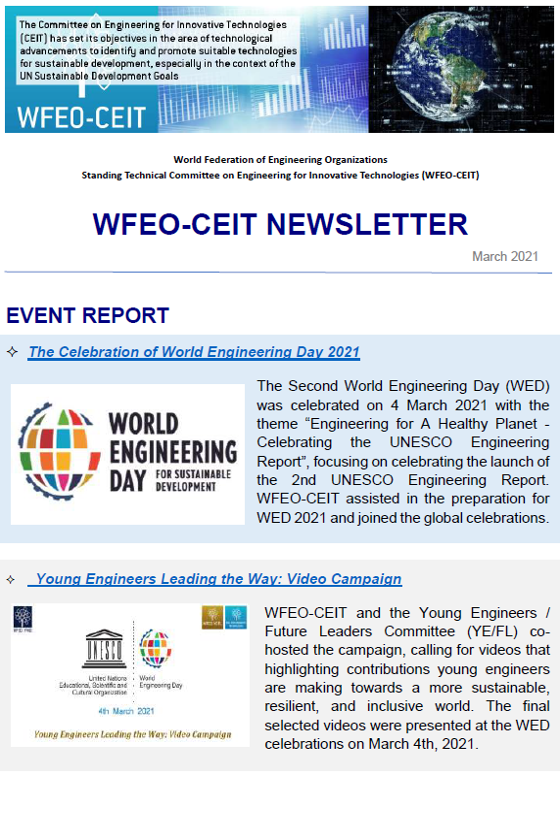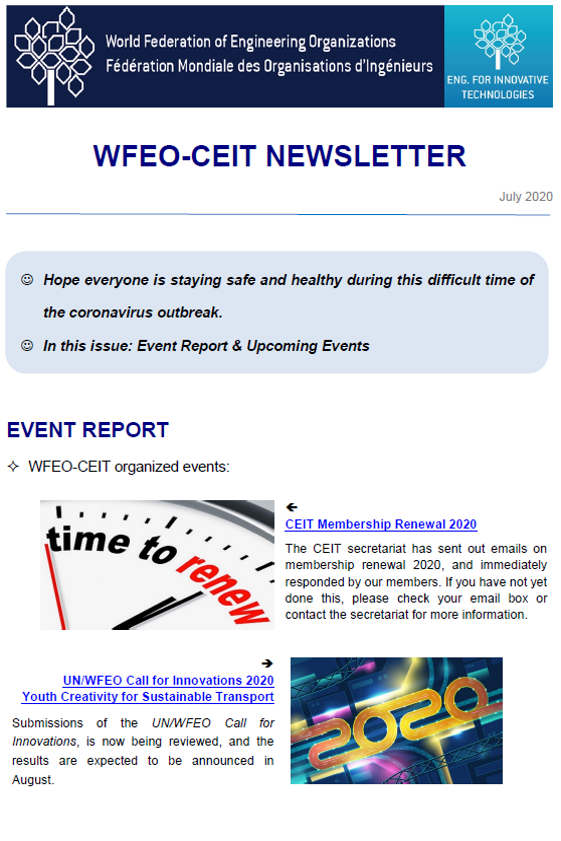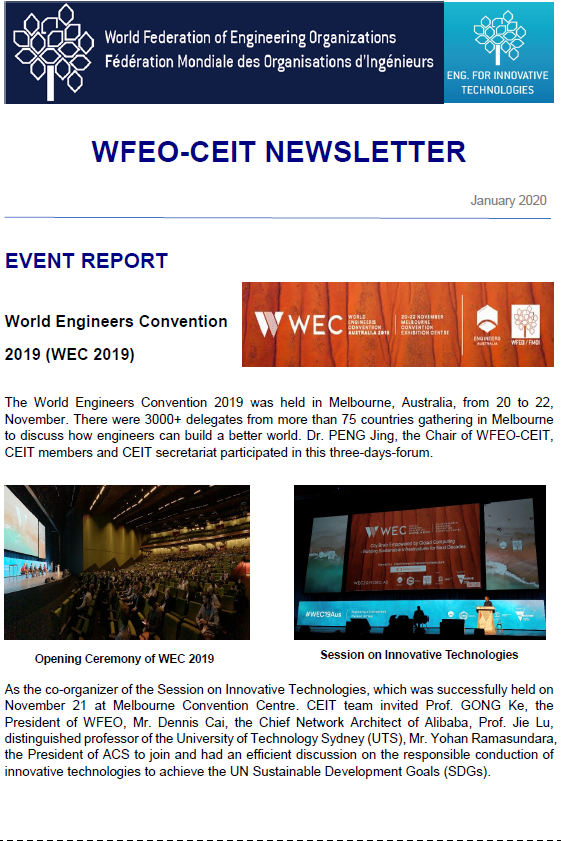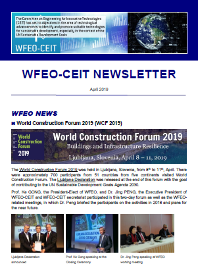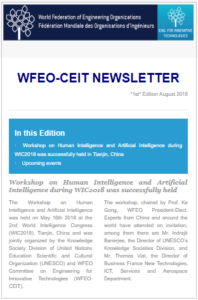
Introduction
The Institution of Engineers, Malaysia serves as the host of the Committee on Engineering for Innovative Technologies (CEIT) from 2023 to 2027. The Committee was earlier known as WFEO Standing Technical Committee on Technology and was transferred from Puerto Rico in November 2007. The Institution of Engineers India (IEI) hosted the Committee from 2007 to 2015 and the China Association for Science and Technology (CAST) hosted the Committee from 2015 to 2023.
The Committee on Engineering for Innovative Technologies (CEIT) has set its objectives in the area of technological advancements to identify and promote suitable technologies for sustainable development, especially in the context of the UN Sustainable Development Goals and the relevant agenda.
Vision
WFEO-CEIT undertakes to lead the engineering profession worldwide towards promotion and application of engineering for innovative technologies for sustainable development and helping developing countries to close the technology gap which is essential to sustain the UN’s 2030 Sustainable Development Agenda.
WFEO-CEIT is dedicated to being a leading international comprehensive platform for engineering professionals from multi-stakeholders to:
- Promote ethical and responsible development and application ofBig Data and Artificial Intelligence.
- ldentify the next innovative technologies for sustainable development.
- Share the innovative engineering experience in building a sustainable society.
- Enhance the national and international collaboration among multi-stakeholders to promote innovative technology engineering for facilitating a sustainable world.
Mission
The core mission of CEIT is to promote engineering of innovative technology for sustainable development, including:
- To represent the engineering profession internationally, providing the collective wisdom and leadership of the profession to assist national agencies choose appropriate policy options that address the most critical issues affecting countries of the world.
- To play a leading role in the identification of essential issues on the innovative technologies for sustainable development and to sustain the UN’s 2030 Sustainable Development Agenda.
- To make infonnation on engineering available to the countries of the world and to facilitate communication between its members nation to the world’s best practices in key engineering activities.
- To enhance the practice of engineering and facilitate the transfer of innovative technologies from achievement to actual productivity, real industrial production and engineering practices.
- To encourage interactions among multi-stakeholders like engineering professionals, governments, financing institutions along with civil societies for promoting public private partnerships for developing and applying innovative technologies.
- To serve society and to be recognized by national and international organizations and the public, as a respected and valuable source of advice and guidance on the policies, interests and concerns that relate engineering and technology to the human and natural environment.
- To promote ethical and responsible development and application of innovative technologies in engineering for sustainability of human being.
- To enhance capacity building in nurturing innovative engineering talents.
- To host conferences, seminars and training to enhance engineering practices worldwide.
Main Activities
- To cooperate with the International Science Council (ISC) to expand further on the position paper on Big Data Ethics, which aims to reach consensus between all stakeholders to attain responsible application of Big Data and Artificial Intelligence.
- To support the activity of the World Engineering Day (IDoE) and provide an annual focus on the essential role of engineering in modern life.
- To cooperate with the Standing Committee on Young Engineers / Future Leaders (YE/FL) to organize training courses or lectures to transfer knowledge of innovative technology for continuing education.
- To organize workshops and symposiums to exchange technical ideas, engineering experience to promote innovative technology implemented in engineering.
- To cooperate with other WFEO STCs and international/national members in CEIT mission relevant activities.
Focused Areas
1. To continue with the focus areas selected by the previous Committee as the main strategic goal of the four-year plan:
A. Big Data
To promote open and equal access to and proper treatment of data worldwide and narrow the data-divide between developed and developing countries.
To exchange new ideas of implementing innovative Big Data technologies into socioenvironmental problems in the fields of social life, such as transportation, education, health care production and consumption, infrastructure, banking and finance.
B. Artificial Intelligence
To share the vision of the potential of Artificial Intelligence in improving, accelerating, and supporting sustainable development.
To facilitate the adoption of Artificial Intelligence in the traditional fields of engineering for enhancing productivity, quality and achieving sustainable development.
C. Innovative Technologies
To identify the next innovative technologies for sustainable development and to enhance collaboration among multi-stakeholders to promote innovative technology engineering for facilitating a sustainable world.
2. To further enhance the focus of the previous Committee with regard to SDG Goal 9 which in simple tenns refers to initiatives and programmes for a society to grow. This entails the development of quality and resilient infrastructure and the promotion of inclusiveness as well as sustainable industrialization, to support economic development and human well-being.
The main Project: Innovative Technologies Assisting Disaster Risk Reduction – the International Meridian Circle Project
The previous Committee had focused on Earthquake which is a major natural disaster that threatens human life and property. They were working on improving the capacity of earthquake prediction that is urgently needed for sustainable development and in tum requires international collaboration as well as technological innovation.
For the next four years, The Institution of Engineers, Malaysia will expand the coverage of this project to include other natural disasters which had occurred in the last century causing damage to properties and loss of lives. Disasters such as landslides, thunderstorms, floods, tomadoes occurred not only in third world/developing countries, it has also caused devastation and social environmental disruption in developed countries.

